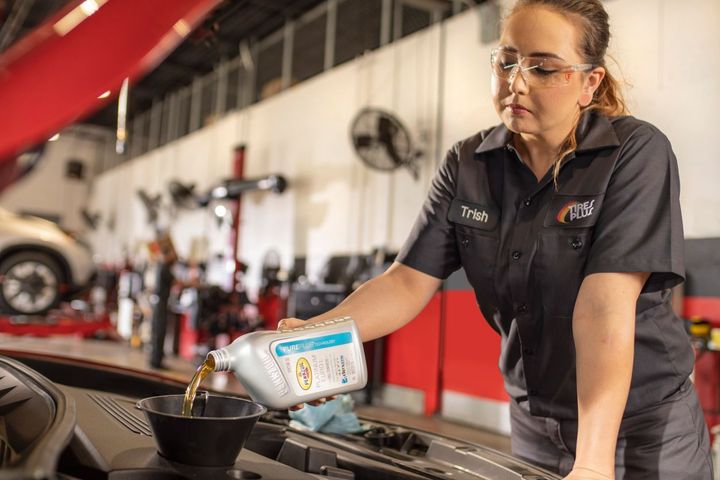


Changing the engine oil is one of the most crucial maintenance tasks for any vehicle. It helps to ensure proper lubrication, cooling, and overall protection of the engine's internal components. When it comes to a brand-new car, the question of when to get the first oil change often arises. The timing of this initial oil change can have a significant impact on the longevity and performance of the engine.
During the initial break-in period of a new engine, the mating surfaces of the moving parts rub against each other, causing microscopic scratches and generating tiny metal particles. These particles can circulate in the oil and potentially cause accelerated wear or damage if not removed in a timely manner.

The oil that comes pre-filled in a new car from the factory is not meant to last very long. It's essentially a temporary lubricant that can quickly become contaminated with metal shavings, debris, and other contaminants from the manufacturing process and those initial break-in miles.
| Contaminants in New Engine Oil |
|---|
| Metal shavings |
| Debris from manufacturing |
| Particles from break-in period |
Imagine trying to run a marathon with a brand new pair of shoes straight out of the box. Sure, they might look pristine and shiny, but they haven't been properly broken in yet. The same principle applies to a new engine – it needs that initial oil change to flush out all the gunk and particles that have accumulated during the break-in period, ensuring a clean slate for the fresh, high-quality oil to do its job effectively.
So, when exactly should you get that first oil change done? The answer lies in your trusty owner's manual. Most manufacturers recommend getting the initial oil change around 1,500 miles, give or take a few hundred miles, unless otherwise specified.
| Typical Recommended Mileage for First Oil Change |
|---|
| 1,500 miles |
| (Check owner's manual for specific guidance) |
However, it's always a good idea to keep an eye on the condition of the oil itself. If you pop open the dipstick and notice that the oil appears dirty or has visible metal particles suspended in it, that's a clear sign that it needs to be changed sooner than the recommended interval.
The process of performing the first oil change is essentially the same as any regular oil change. You'll need to:
Drain the old oil
Replace the filter
Refill with fresh, high-quality oil per the manufacturer's specifications (both in terms of type and quantity)
For a new engine, it's best to use the recommended grade of high-quality synthetic or synthetic-blend oil, along with an OEM (Original Equipment Manufacturer) or premium oil filter. This ensures proper lubrication and protection for those delicate, freshly broken-in components.
| Recommended Oil and Filter for First Change |
|---|
| High-quality synthetic or synthetic-blend oil |
| OEM or premium oil filter |
After that initial change, it's crucial to follow the manufacturer's recommended intervals (typically 5,000-10,000 miles) for future oil changes. This will keep your engine running smoothly and efficiently for years to come.
| Typical Oil Change Intervals |
|---|
| 5,000 - 10,000 miles |
| (Check owner's manual) |
It's also important to note that severe driving conditions, such as:
Towing
Idling
Stop-and-go traffic
Extreme temperatures
May require more frequent oil changes than normal use. Always consult your owner's manual for specific guidance based on your driving habits.
Now, let's talk about the cost of an oil change. It can range from $20 to $100 at a service center, depending on several factors:
| Factors Affecting Oil Change Cost |
|---|
| Type of oil used (conventional, synthetic blend, full synthetic) |
| Vehicle size and oil capacity |
| Labor costs based on location |
| Dealer vs. independent shop |
If you're feeling handy, you can even do it yourself with supplies from an auto parts store, which can cost anywhere from $30 to $45 for the oil and filter, saving you the labor costs. Many service centers also offer coupons and discounts, so be sure to keep an eye out for those.
In the grand scheme of things, the cost of an oil change is a relatively small investment compared to the benefits of maintaining your vehicle and ensuring its longevity. Trust me, it's a lot cheaper than having to replace an engine down the line due to neglect or improper maintenance.
So, there you have it, folks – the lowdown on why that first oil change on a new car is so crucial, and when you should get it done. It might seem like a minor task, but it's one of those little things that can make a big difference in the long run.
Remember, your car is a significant investment, and taking care of it from the get-go is the key to ensuring it runs smoothly and efficiently for years to come. Don't skimp on that first oil change – your engine will thank you for it!

By following the recommended intervals for oil changes and using high-quality oil and filters, you'll be doing your part to protect your engine and extend its lifespan. It's a simple maintenance task that can save you a lot of headaches and costly repairs down the road.
So, the next time you bring home a shiny new car, make sure to schedule that first oil change as soon as possible. Your engine will be running like a well-oiled machine (pun intended), and you'll have the peace of mind knowing that you're taking care of your investment from the very beginning.
Delaying the first oil change can allow metal shavings and contaminants to circulate longer, potentially causing accelerated wear and damage to the engine components. It's best to follow the manufacturer's recommended interval for that initial change.
Check the oil on the dipstick - if it appears dirty or has visible metal particles suspended in it, that's an indication the oil needs to be changed sooner than the recommended mileage interval.
It's recommended to use a high-quality synthetic or synthetic-blend oil, along with an OEM or premium oil filter, to ensure proper lubrication and protection for the freshly broken-in engine components.
After the initial change, follow the manufacturer's recommended intervals, typically ranging from 5,000 to 10,000 miles, for future oil changes.
Yes, severe conditions like towing, idling, stop-and-go traffic, or extreme temperatures may require more frequent oil changes than normal use. Consult your owner's manual for specific guidance.
Yes, you can change the oil yourself by purchasing supplies from an auto parts store, which can cost around $30 to $45 for the oil and filter, saving you the labor costs of a service center.
The type of oil used, vehicle size and oil capacity, labor costs based on location, and whether it's a dealer or independent shop can all impact the cost of an oil change at a service center.
Many service centers offer coupons and discounts on oil changes, so it's worth keeping an eye out for those to save some money.
Using high-quality oil and filters helps ensure proper lubrication and protection for your engine, which can extend its lifespan and prevent costly repairs down the line.
Regular oil changes help maintain your vehicle's efficiency, prevent excessive wear and tear, and ultimately extend the life of your engine, saving you money in the long run by avoiding costly repairs or replacements.

Sarah isn't your average gearhead. With a double major in Mechanical Engineering and Automotive Technology, she dived straight into the world of car repair. After 15 years of turning wrenches at dealerships and independent shops, Sarah joined MICDOT to share her expertise and passion for making cars run like new. Her in-depth knowledge and knack for explaining complex issues in simple terms make her a valuable asset to our team.








